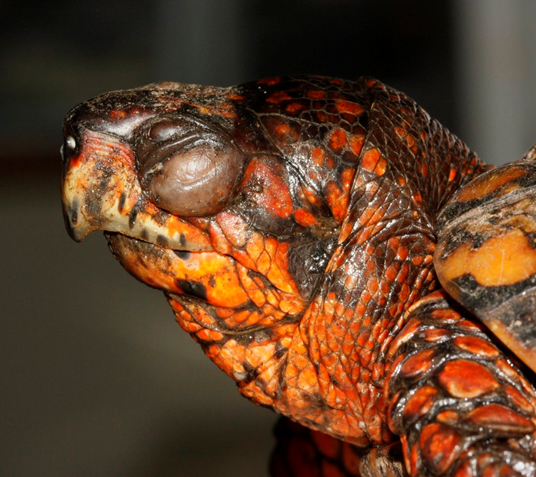(Click above to watch video)
No one forgets their first encounter with a frog, salamander, turtle, or the sound of a frog chorus heralding the first days of spring. These events mark places and seasons in our minds – connecting us to nature and revealing how we fit into the larger world. They can be life-changing.
Sadly, many of these animals are disappearing and a major threat to their survival is infectious diseases. Ranavirus is one of the leading causes of amphibian population declines around the world.
Turtles, snakes, and fish are also susceptible to Ranavirus.
Once infected, animals can experience severe internal bleeding and rapid death. In fact, scientific evidence shows that populations of species sensitive to these viral infections could go extinct within just a few years.
How does Ranavirus spread to amphibians and reptiles? People can unknowingly carry the virus, which can attach to skin, boots, clothes, equipment, vehicles, and recreational gear, from a wetland with the disease to another without it. Once introduced, the virus can spread quickly.
Frogs, toads, and salamanders with Ranavirus can develop skin lesions, blood spots, and swollen abdomens. Infected turtles will often have a runny nose, swollen neck, and white plaques inside the mouth. Diseased animals may act lethargic, move erratically, or fail to react when threatened. However, not all animals carrying Ranavirus will display symptoms.
You can help slow the spread of Ranavirus by using these simple steps – before and after you enter a wetland.
BRUSH; RINSE; BLEACH; RINSE as illustrated in the video above.
- To begin, set up your cleaning station at least 100 feet away from any wetland or body of water to avoid contaminating them with bleach.
- BRUSH the dirt off your boots and gear and RINSE with clean water.
- Soak or spray them in a solution of 10% BLEACH or 1 cup of household bleach in one gallon of water, and leave this on for 5 minutes.
- Finish by RINSING everything well with clean water.
- At a minimum for larger equipment and gear, pressure wash and allow to air dry.
To learn more about Ranavirus and other emerging infectious diseases or to report sick or dead animals, go to: www.RanavirusDecon.org.
Remember: Brush, Rinse, Bleach, and Rinse
By taking these simple measures you will do your part to protect our amazing wildlife!


